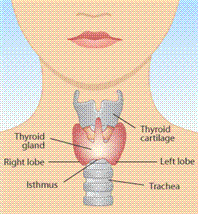Sadly it's 3 times more likely for you to contract Thyroid Disease if you have Coeliac Disease and vice versa, according to NICE guidelines and figures.
We know that many Coeliacs continue to fell unwell on a strict GF. Yet it can be hard to get Doctors to believe that Coeliacs are not 'cheating' on the the GF Diet and so we've invited one of the other auto-immune groups here on HealthUnlocked to help raise awareness of Thyroid Disease.
************Hypothyroidism – Getting a Diagnosis**************
Undiagnosed hypothyroidism (an underactive thyroid) can cause a great strain on the heart. Hypothyroidism can cause coronary atherosclerosis (furring up of the arteries) due to high cholesterol levels. Dr Rowan Hillson tells us in her book, “Thyroid Disorders”, “Lack of T3 and T4 alters fat metabolism… and this can lead to furring of the coronary arteries (coronary atherosclerosis) and reduction of the blood supply to some of the heart muscle. This causes angina… - pain in the chest on exercising, which is usually relieved by rest. Coronary atherosclerosis can cause angina, a heart attack or coronary thrombosis.”
Hypothyroidism is often missed because it often affects women at particular times in their lives such as after having a baby or around the menopause. It is very important not to miss a diagnosis of hypothyroidism though because of the heart problems it can cause.
Overt hypothyroidism (clear hypothyroidism) affects 2% of women and 0.2% of men. Sub-clinical hypothyroidism (when the TSH is above the range and the FT4 is within range) affects 6-8% of women and 3% of men. 2.5% of pregnant women develop hypothyroidism.
Some of the symptoms of hypothyroidism
• Tiredness
• Weight gain
• Breathlessness
• Dizziness
• Palpitations
• Feeling cold all the time, even in summer
• Puffy face
• Loss of libido
• Dry or gritty eyes
• Hoarse voice
For a full list go to:
thyroiduk.org.uk/tuk/pages/...
The tests for thyroid disease
The most common thyroid tests are Thyroid Stimulating Hormone (TSH), Free T4 (FT4) and Free T3 (FT3).
Sometimes the thyroid antibody tests will be done – Thyroid Peroxidase (TPO) and Thyroglobulin (TgAb) - but not often. These tests will determine if you have Hashimoto’s Disease, the autoimmune type of thyroid disease. There is a paper discussing the fact that early treatment of euthyroid (normal thyroid hormone levels) Hashimoto’s Thyroiditis with thyroxine may slow down the disease process.
There is also evidence that shows that anti-thyroid antibodies can cause infertility and miscarriage. It is therefore a good idea to find out if you have high thyroid antibodies and discuss treatment with thyroxine with your doctor.
Doctors will look at the range of your tests to decide whether you are “normal” or not. However, Thyroid UK recommends that you should always ask for the actual figures of your test results – your level as well as the ranges. Be aware that different areas in the country use different test ranges so one TSH test range might be 0.5 – 5.0 but in another area the TSH range might be 0.4 - 4.0. You could be “borderline” (near the bottom or top of the range) or have “subclinical hypothyroidism” (high TSH and normal FT4) and not be aware of this because you have not been given the ranges of the tests. Subclinical thyroid disease is not usually treated although treatment may be useful.
The 2006 Thyroid Function Test Guidelines state, “There is no evidence to support the benefit of routine early treatment with thyroxine in non-pregnant patients with a serum TSH above the reference range but <10mU/L.” which in layman’s terms means that patients who have a TSH of less than 10 need not be treated because it doesn’t help. However, they also state that, “Physicians may wish to consider the suitability of a therapeutic trial of thyroxine on an individual patient basis.”
If your TSH test is above the range but less than 10, it might be an idea to discuss these Guidelines with your doctor as it may persuade him to give you a trial of thyroxine. In our experience, patients with signs and symptoms of hypothyroidism who have a normal TSH and low normal FT4 also benefit from a trial of thyroxine.
Other health problems can have similar symptoms to hypothyhroidism so Thyroid UK suggests that other tests are done such as B12, folate, ferritin, cholesterol.
The usual treatment for hypothyroidism is levothyroxine, although there are other treatments.
If hypothyroidism is diagnosed treatment will be life-long and you will be entitled to free prescriptions for all your medications.
There is more information on our website:
and we have a Patient Information Leaflet entitled, “Getting a Diagnosis and Starting Treatment” which can be obtained by sending an email to:
enquiries@thyroiduk.org and putting “Getting a Diagnosis” in the subject of the email.
